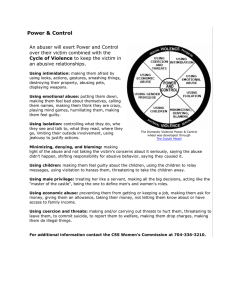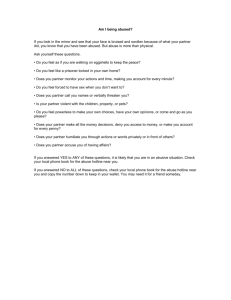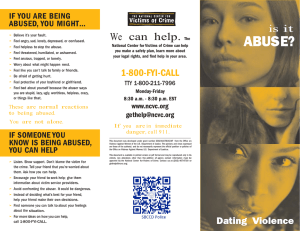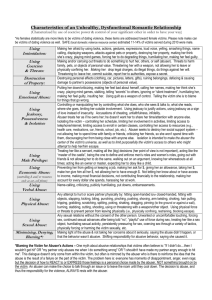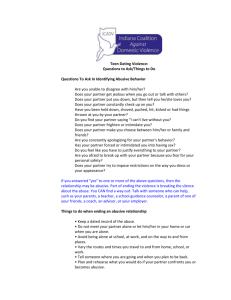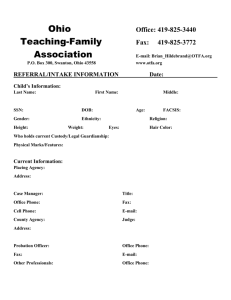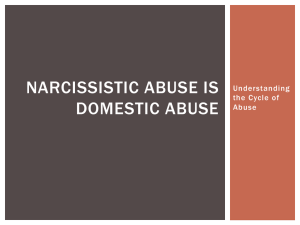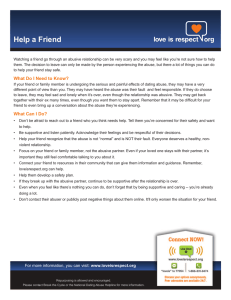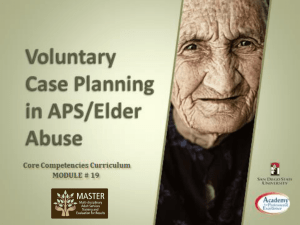symptoms of - Reslife.net
advertisement
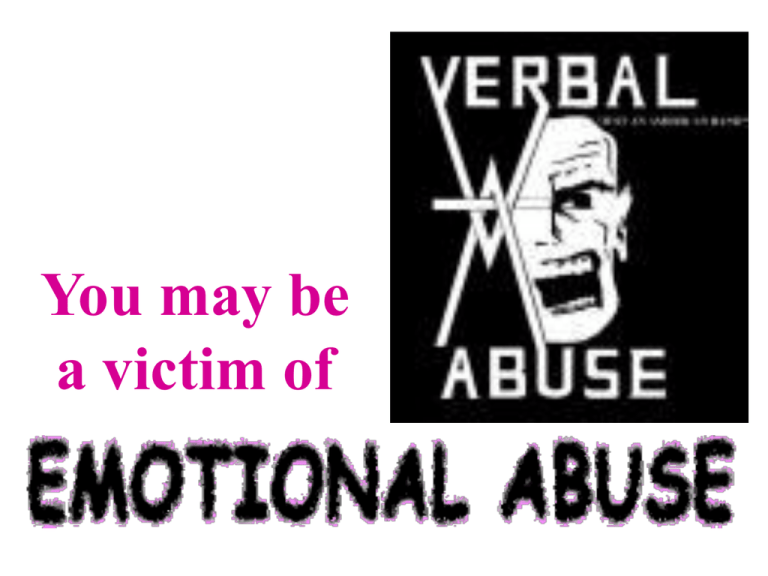
You may be a victim of Sign of Emotional Abuse • Are you anxious and worried about what will happen when you and your significant other are together? Apart? • Are you the subject of name-calling? • Are you the subject of yelling? • Are you the subject of screaming? • Are you the subject of threats? Many people assume that if they're not being physically abused by their partner, then they're not being abused. That's not necessarily true. You may be in a relationship which is draining something from you -- you might not have recognized that your partner has eroded your selfesteem and happiness. Phase 1 - TENSION BUILDING: Tension increases, breakdown of communication, victim feels need to placate the abuser. Phase 4 CALM: Incident is "forgotten", no abuse is taking place. Phase 3 RECONCILIATION: Abuser apologizes, gives excuses, blames the victim, denies the abuse occurred, or says it wasn't as bad as the victim claims. Phase 2 INCIDENT: Verbal and emotional abuse. Anger, blaming, arguing. Threats. Intimidation. Hard to tell if your partner is abusive? An abusive partner will railroad discussions, so that you don't have time to think about what's right and what's wrong in their behavior. 'Jeckell and Hyde behavior': Your partner is wonderful and caring for a while and then will do an about face and be angry about things that they thought were fine at an earlier time. They switch back and forth between behaviors for no apparent reason. 'Life Would be so Good If' You frequently think that your relationship would be perfect if not for his or her emotional storms. The storms seem to be coming more and more frequently. Between times, life is wonderful, but when a storm is coming you can often tell by that 'Walking on Eggs Feeling'. 'That Walking On Eggs Feeling' You feel at times that any action on your part will cause your partner to erupt into anger. You try to do everything you can think of to avoid it, but the longer the feeling goes on, the more likely the blowup will happen, no matter what you do. 'I Can't Stand You, But You Better Not Leave' Your partner keeps telling you that you aren't worth having a relationship with, but will not consider breaking off the relationship. Acts more outrageously when he or she finds out you are attempting to leave the relationship. 'So Much, So Fast' Your partner just met you and doesn't know much about you, but he or she has to have you, so you must commit now. 'It's You That's the Problem' Your partner never seems to consider his or her own part in your domestic disputes. You get blamed for all problems because of the most ridiculous things. 'This Happened to Me and It's All Your Fault' You are blamed for your partners problems even when it was his or her responsibility to not make mistakes. This could be things like him or her not getting to work on time and getting in trouble, not getting a job, not paying the bills in a timely manner, etc. 'Overreacting' Your partner way overreacts to little irritations. Small offenses like leaving the cap off the toothpaste cause him or her to have huge anger scenes or act out in an outrageous manner. 'I Will Get You for That' Your partner doesn't try to negotiate a better relationship, but retaliates by doing something to you that he or she knows will hurt you emotionally. 'All the Fights are about What I Do Wrong' You never seem to be able to talk about his or her wrong actions, the discussion seems to always be about what you did wrong and there seems to be always something new that you did wrong. 'You are Worthless' Your partner keeps telling you that all your problems are because you can't manage to do anything right. 'Unrealistic Expectations' Your partner is dependent on you for all his/her needs and expects you to be the perfect mate, lover and friend. You are expected to meet all of his/her needs. 'Blames Others for His/Her Feelings' You are told, "You make me mad," "you're hurting me by not doing what I ask,: or "I can't help being angry". 'Intense Jealousy' Your partner tells you that expressing jealousy is a sign of love. Jealousy is a sign of insecurity not love. You are questioned about who you talk to and you may frequently receive calls or unexpected visits during the day. 'Isolation' He or She have attempted to cut off your family, friends, and independent financial resources. Your friends and family are put down and you are put down for socializing with them. You or they are accused of ridiculous motives. EFFECTS OF LONG-TERM EMOTIONAL & VERBAL ABUSE 0N THE VICTIM • • • • • • • Isolation from others Low self-esteem Depression Emotional problems Illness Increased alcohol or drug use Withdrawal from real life into an Internet alternative reality If you or someone you know might be in an emotionally abusive relationship… Get Help! Contacts • A Student Affairs Staff Member • The College/University Counseling Center • National Council on Child Abuse and Family Violence 1-800-2222000 • National Resource Center on Domestic Violence 1-800-5372238 • National Women's Resource Center – 1-800-354-8824
